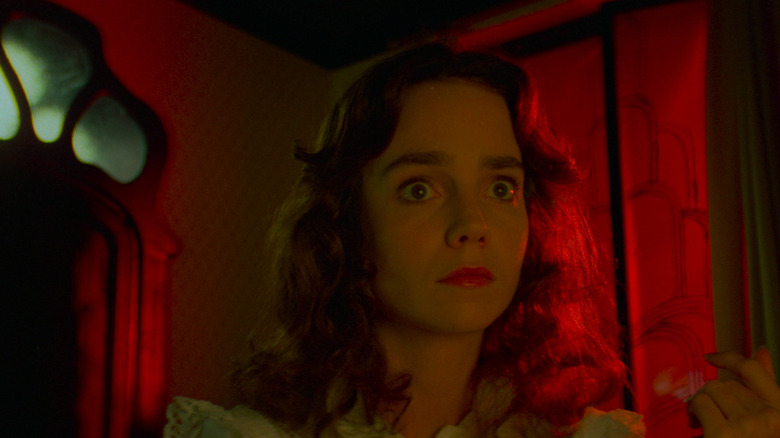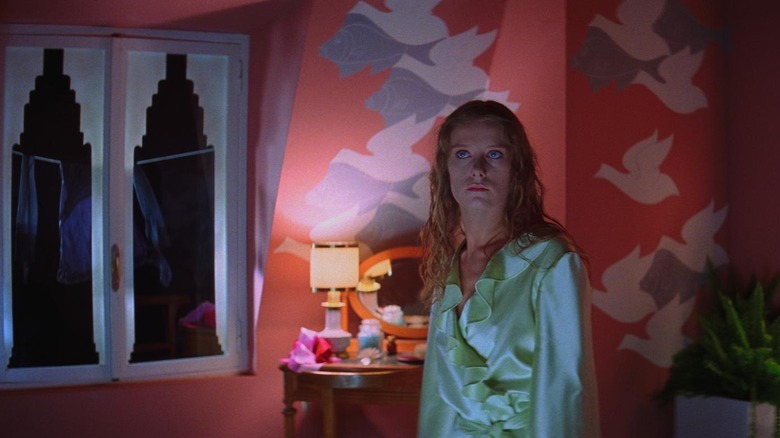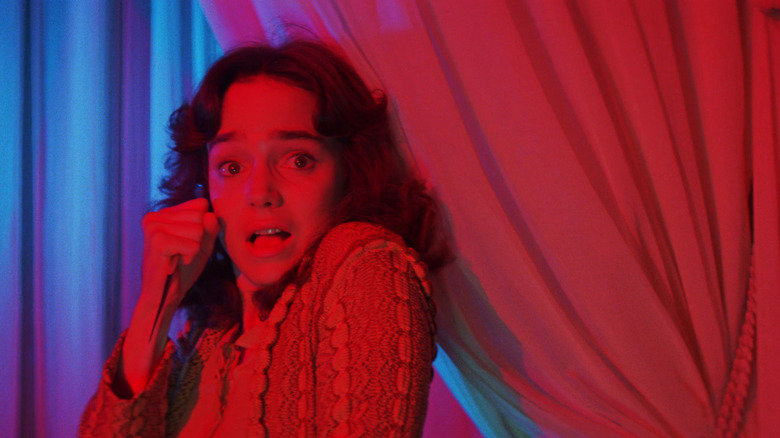
Dario Argento's campy Italian horror "Suspiria" has been a source of inspiration for many American horror films. Lots of people have drawn comparisons between Argento's work and classic slasher films like "Halloween," as well as contemporary A24 horror movies like "Hereditary." Even though the genre might take influence from Argento today, the director himself feels like these American horror films could not be any more different from his work.
The original 1977 "Suspiria" is full of bright colors and jarring sounds. The director was not afraid to disconcert his audience and bend reality. Each frame is painterly and every camera movement builds suspense. Tension boils under the surface and spikes up violently until culminating in total destruction. The film centers around a dance school that is secretly run by a coven of witches, a theme that the remake more closely explores. The 2018 "Suspiria" remake, directed by Luca Guadagnino, was a much more grounded and literal interpretation of the story that Argento first told. "To me, the remake of Suspiria doesn't look like a well-realized project," Argento confessed to Interview. "It lacks fear, music, tension, and scenic creativity."
There were some gory scenes in the remake that made me squirm, but it did not put me on edge the same way that the 1977 film had. Argento, too, is less freaked out by on-screen gore than he is by his own imagination. Perhaps this is why he found the remake so off-putting. "Horror movies rarely scare me. I'm more frightened by nightmares," he admitted. "Walking through my house alone can get me scared depending on what's going on in my mind. Sometimes I feel surrounded by presences. But I guess that's just inside my head—in the obscure half."
Argento's Films And Slasher Films Are Two Totally Different Genres

American horror films depend on memorably violent scenes to cause a stir, but Argento went a more surreal route with "Suspiria." The moments where a brutally murdered body is shown onscreen are the least terrifying moments of the entire film. Argento's films unsettle the audience and beg to be analyzed, while American slasher films elicit a very visceral audience reaction. "I think my films and American slashers are two completely different genres," Argento explained. "I deal with psychology and the subconscious; without those elements, my films wouldn't make any sense. Teenage horror movies don't have anything to do with that, and most of the time they're pointless and childish."
Although Argento is critical of some American films, he remains friendly with many American directors. "I know lots of American directors and I'm friends with them," he told Electric Sheep Magazine. Argento's circle includes a few major names in Hollywood. "Of course, John Carpenter is a great friend of mine," the director added. Carpenter has cited "Suspiria" as a major influence of his and named it one of his five favorite films for Le Cinema Club. The two directors even interviewed each other once for Nocturno Cinema. "John Carpenter is a saint," Argento said (via Narkive).
As for the "Suspiria" director's criteria for excellence, he only asks that horror films lend themselves to complex analysis. "I like strong direction that's not for children, I don't like children's films, I like films for adults that are strong and deep and profound," Argento clarified. The filmmaker isn't beholden to the horror genre when it comes to his taste in films. "I also like mannerist directors like Quentin Tarantino -- I love mannerism, it's interesting!" he exclaimed.
But The Suspiria Director Still Admires American Horror Films

Argento prefers horror films that break the mold, and he is not alone. Directors like Jordan Peele have taken a more "psychological" approach to horror with his films "Get Out," "Us," and "Nope." Meanwhile, movies like "Hereditary" have also taken unconventional approaches to camera movement and visual storytelling. "Films like 'Get Out' and 'Hereditary' have struck me for their beautiful photography, their plot, and their production," Argento told Interview.
As for the films that influenced Argento, he was happy to share. "A big influence, someone I admired especially, was [Michelangelo] Antonioni, and also Ingmar Bergman," he revealed to Electric Sheep. Antonioni is known for films like "Blow-Up," and Bergman is best recognized for films such as "Persona." "The French New Wave was very important for me because it broke away and changed everything," Argento added, referring to directors like Jean-Luc Godard and Francois Truffaut. Argento also cited the Italian neorealist director Federico Fellini and the surrealist filmmaker Luis Buñuel as sources of inspiration.
Argento is Italian himself, and was influenced most heavily by European films, so his cinematic sensibility is extremely European. Films based in visceral realism don't appeal to him because he is a student of surrealist cinema. He prefers psychological thrillers to fleeting jump-scares, unrealistic beauty to a simulation of gritty reality. Even if you don't agree with Argento and totally love gory slashers, you're in luck — his cerebral sensibility inspired some of the first films in the goriest horror sub-genre of all time.
Read this next: The Best Cosmic Horror Movies That Will Make You Hate The Unknown
The post Dario Argento Doesn't See The Link Between His Films And American Horror appeared first on /Film.
0 Comments